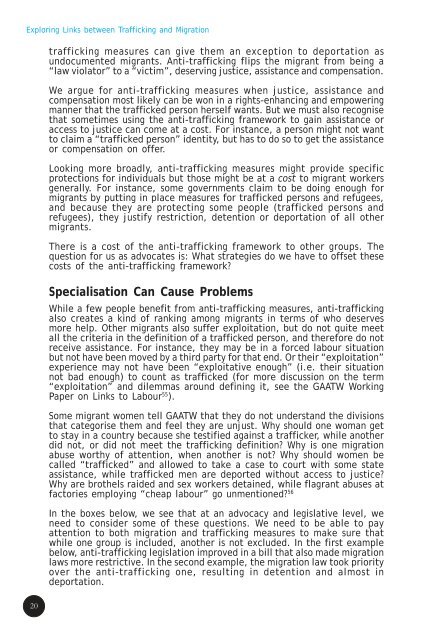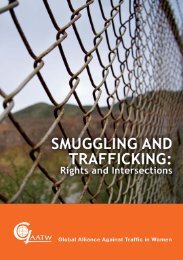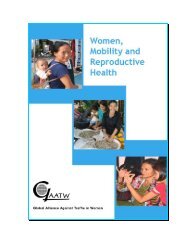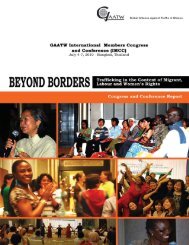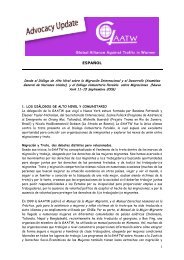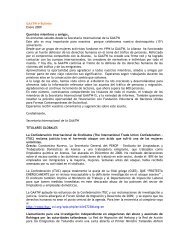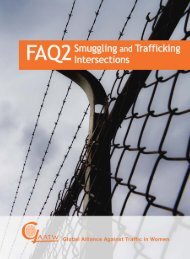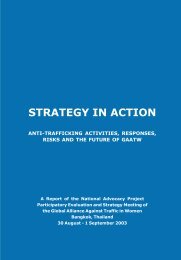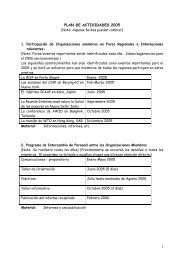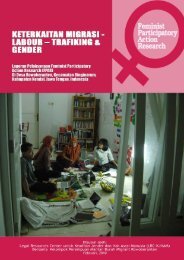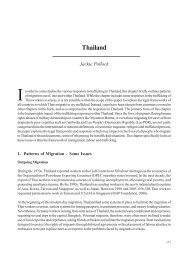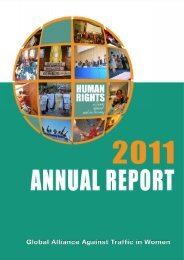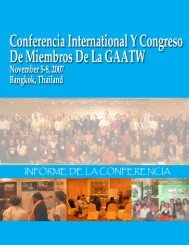Exploring Links between Trafficking and Migration - Global Alliance ...
Exploring Links between Trafficking and Migration - Global Alliance ...
Exploring Links between Trafficking and Migration - Global Alliance ...
- No tags were found...
Create successful ePaper yourself
Turn your PDF publications into a flip-book with our unique Google optimized e-Paper software.
<strong>Exploring</strong> <strong>Links</strong> <strong>between</strong> <strong>Trafficking</strong> <strong>and</strong> <strong>Migration</strong>trafficking measures can give them an exception to deportation asundocumented migrants. Anti-trafficking flips the migrant from being a“law violator” to a “victim”, deserving justice, assistance <strong>and</strong> compensation.We argue for anti-trafficking measures when justice, assistance <strong>and</strong>compensation most likely can be won in a rights-enhancing <strong>and</strong> empoweringmanner that the trafficked person herself wants. But we must also recognisethat sometimes using the anti-trafficking framework to gain assistance oraccess to justice can come at a cost. For instance, a person might not wantto claim a “trafficked person” identity, but has to do so to get the assistanceor compensation on offer.Looking more broadly, anti-trafficking measures might provide specificprotections for individuals but those might be at a cost to migrant workersgenerally. For instance, some governments claim to be doing enough formigrants by putting in place measures for trafficked persons <strong>and</strong> refugees,<strong>and</strong> because they are protecting some people (trafficked persons <strong>and</strong>refugees), they justify restriction, detention or deportation of all othermigrants.There is a cost of the anti-trafficking framework to other groups. Thequestion for us as advocates is: What strategies do we have to offset thesecosts of the anti-trafficking framework?Specialisation Can Cause ProblemsWhile a few people benefit from anti-trafficking measures, anti-traffickingalso creates a kind of ranking among migrants in terms of who deservesmore help. Other migrants also suffer exploitation, but do not quite meetall the criteria in the definition of a trafficked person, <strong>and</strong> therefore do notreceive assistance. For instance, they may be in a forced labour situationbut not have been moved by a third party for that end. Or their “exploitation”experience may not have been “exploitative enough” (i.e. their situationnot bad enough) to count as trafficked (for more discussion on the term“exploitation” <strong>and</strong> dilemmas around defining it, see the GAATW WorkingPaper on <strong>Links</strong> to Labour 55 ).Some migrant women tell GAATW that they do not underst<strong>and</strong> the divisionsthat categorise them <strong>and</strong> feel they are unjust. Why should one woman getto stay in a country because she testified against a trafficker, while anotherdid not, or did not meet the trafficking definition? Why is one migrationabuse worthy of attention, when another is not? Why should women becalled “trafficked” <strong>and</strong> allowed to take a case to court with some stateassistance, while trafficked men are deported without access to justice?Why are brothels raided <strong>and</strong> sex workers detained, while flagrant abuses atfactories employing “cheap labour” go unmentioned? 56In the boxes below, we see that at an advocacy <strong>and</strong> legislative level, weneed to consider some of these questions. We need to be able to payattention to both migration <strong>and</strong> trafficking measures to make sure thatwhile one group is included, another is not excluded. In the first examplebelow, anti-trafficking legislation improved in a bill that also made migrationlaws more restrictive. In the second example, the migration law took priorityover the anti-trafficking one, resulting in detention <strong>and</strong> almost indeportation.20


